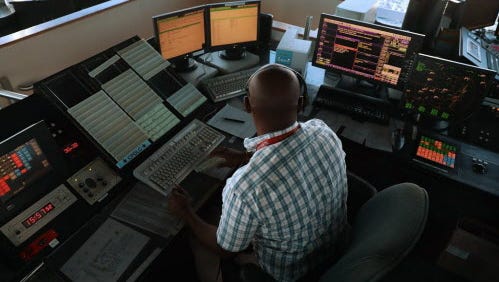House unveils latest bill to privatize air-traffic control

WASHINGTON — A House chairman unveiled his latest proposal Wednesday to move air-traffic control out of the Federal Aviation Administration and to a non-profit corporation governed by industry stakeholders, setting off a contentious debate that will play out through the fall.
Rep. Bill Shuster, R-Pa., said the change would allow faster, more efficient modernization of the system from ground-based radar to satellite-based GPS.
Strong support from President Trump and airlines, along with changes to the corporation's board and for general-aviation, improved the bill's chances from a similar proposal last year, he said.
Airlines and the union representing controllers supported Shuster's previous attempt to remove air-traffic control from political disputes in Congress that led to a government shutdown and furloughs — and 23 extensions spanning five years for a recent FAA bill.
"For too many years, we have put money into the FAA to develop new technologies and gotten very little back. It's really a waste of the taxpayers' money —billions of dollars," Shuster said. “Maintaining the status quo is unacceptable."
Shuster heads the House Transportation and Infrastructure Committee, which he said would vote on the proposal June 27. His committee approved a similar proposal last year, but amid opposition it wasn't considered by the full House or Senate. Legislation governing the FAA must be approved by Sept. 30, and Shuster hopes the air-traffic control proposal will be part of the bill Congress approves.
But Shuster must navigate congressional turbulence ahead:
• Lawmakers who decide how where to spend money are concerned about losing oversight of air-traffic control at FAA.
• Tax-writing lawmakers must still agree to giving up airline taxes that currently pay for the FAA, which the airlines expect to pay in user fees to the corporation.
• Rural lawmakers are worried about how the corporation would treat general aviation, which ranges from private pilots in propeller planes to large corporate jets.
The top Democrat on the committee, Rep. Peter DeFazio of Oregon, said he remained “steadfastly opposed” to privatization, which he said would tear apart the FAA and jeopardize safety.
“The legislation does nothing to address the major concerns raised by a bipartisan group of opponents about whether air traffic control privatization would guarantee safety, protect national security, expedite new technology, and keep our aviation system solvent,” DeFazio said.
Trump called the privatization effort one of his top priorities as part of his budget and to spur development across the country. Airlines are pushing hard for the proposal because more precise guidance of flights is expected to allow more planes in the sky, while routes are shorter and more efficient, to save fuel and reduce emissions.
The corporation would be governed by a 13-member board. Shuster's bill differs slightly from Trump's guidelines by calling for a chief executive officer, two members appointed by the secretary of transportation, one for passenger airlines, one for cargo airlines, one for regional airlines, one for general-aviation, one for business jets, one for controllers, one for airports, one for commercial pilots and two at-large seats chosen by the rest of the board.
General-aviation advocates fear that the corporation will favor airlines at busy airports and will charge higher fees than the government. Groups including the Aircraft Owners and Pilots Association, the General Aviation Manufacturers Association, the National Air Transportation Association and the National Business Aviation Association issued a joint statement opposing the effort.
"We have concluded that any structural and governance reforms that require protections for an important sector of users is fundamentally flawed," the statement said.
Shuster said general-aviation wouldn't pay fees to the corporation and would continue paying their current fuel taxes to the government to pay for other facets of FAA. Details over taxation will be decided by the Ways and Means Committee.
"We continue to build momentum," said Shuster, who noted he represents the most rural district in Pennsylvania and wouldn't do anything to hurt the Altoona airport. "I just think the idea is so good on the merits that we need to walk senators through this, just like in the House."
Critics have also argued that the government shouldn’t give away FAA equipment and property worth billions of dollars without charging the corporation for it.
“This legislation would hand over billions of dollars of taxpayer-owned assets, including incredibly valuable spectrum, to a private corporation run by special interests free of charge,” DeFazio said. “It gives the private corporation the power to tax the public to pay for the system, and set and adjust air routes, which could jeopardize small and mid-sized airports and rural access to the skies.”
Towers at smaller airports staffed with contract workers, which are often targeted in budget cuts, would benefit from more reliable funding under the corporation than under Congress, Shuster said. Taxpayers have already paid for the equipment so travelers shouldn’t be charged twice for it through the corporation, he said.
"I think it's unfair to have the flying public pay twice for something," Shuster said.